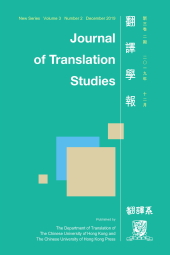 |
|
|||||||||||||||||||||||||||||||||||||||||||||||||||||||||||||||||||||||||||||||||||||||
| 晚清譯家吳檮的「對譯」實踐與文體風格 |
|---|
| 吳燕(Yan Wu) 多摩大學 (Tama University) |
|
摘要 吳檮是清末民初翻譯界一名重要且神秘的翻譯家。他的譯作不多,但譯文風格獨特,且具有相當代表性。本文通過對其所有現存作品及其日文原本的梳理、比照與分析,歸納出構成吳檮譯本獨特文體風格的三個重要因素:對日文原文排版乃至標點符號等各要素的搬用;「移轉原文呼吸」的斷句方式的借用;盡可能照搬言文一致文體中漢字語詞的排列形式,並以填充的方式從中生成一個新的文本。筆者認為,吳檮的翻譯策略或可視為循字迻譯的「對譯」法的一種實踐形態,但又不止於此。這種「對譯」法是清末文人與日本言文一致書寫語體相遇這一獨特歷史境遇下的產物,且它更於無形中開啟了白話文體現代轉型的一種新的可能。 |
|
Abstract Wu Tao was an important and mysterious translator in the translation field during the period of the late Qing Dynasty. He only has a few works published, but his translation style is too unique to be neglected. Through chronologically arranging all his existing works, and closely comparing and analyzing them with their Japanese originals, this paper summarizes three important factors that constitute the unique style of Wu Tao’s translation: the incorporation of various elements such as Japanese original typesetting and even punctuation into the translated texts; simulating and recreating the “breathing of the text,” i.e., to imitate the breaking up of the original Japanese sentences as much as possible; maintaining the exact order of the Chinese words. This paper holds that Wu Tao’s translation strategy can be regarded as a practical form of the “translation” method of word-translating, but it does not stop there. This kind of translation method is a product stem from the unique historical situation when the literati in the late Qing Dynasty encountered the Meiji Japanese writing style. It also opens a new possibility for the modern transformation of the vernacular style. |
| 「高臨民眾的上頭」—辛酉劇社《狗底跳舞》的翻譯與演出 |
|---|
| 李佳偉(Jiawei Li) 香港中文大學 (The Chinese University of Hong Kong) |
|
摘要 1929 年5 月18日,辛酉劇社愛美的劇團上演了由朱穰丞翻譯、導演的安德烈耶夫的《狗底跳舞》。此劇是為辛酉劇社公演而重新翻譯的劇本,但其選材與翻譯方法皆不符合愛美劇團演出的旨趣。朱穰丞希望以高水平藝術引導觀眾,選擇其認為有價值的劇本,並在翻譯中試圖展現原劇面貌。本文將使用幾組或被忽視,或不為人知的史料,通過文本細讀與歷史語境的考察研究此劇的翻譯與演出,並追溯背後的思想資源。《狗底跳舞》的特殊呈現方式體現了愛美劇場演出外國劇本時採取翻譯策略的動態性與複雜性。 |
|
Abstract On 18 May 1929, Xinyou Drama Society staged Leonid Andreev’s The Waltz of the Dogs, which was translated and directed by Zhu Rangcheng. The choice of the playtext was different from those staged by Shanghai amateur drama groups, so were the translation methods adopted. Zhu Rangcheng expected to educate the audience by showing them real art, so he chose what he thought to be of high artistic value and tried to represent the original in his translation. Referring to several less–used or unknown sources, this article first analyzes the features presented in the production of the play, and then explores the reasons behind and the impact it had on both Xinyou and other amateur drama groups in Shanghai. The production of The Waltz of the Dogs reveals the dynamic and interactive nature of the translation activities on Shanghai stage. |
| 兩個世界的對話:《西遊記》的英譯與《西遊記》的研究 |
|---|
| 吳曉芳(Xiaofang Wu) 香港中文大學 (The Chinese University of Hong Kong) |
|
摘要 近十多年來,《西遊記》的英譯研究日益受到學界重視,研究成果不斷湧現,但是以往的學者偏重單個譯本的研究或多個譯本的比較,鮮有從歷時的角度梳理《西遊記》英譯史的發展脈絡,並比照《西遊記》學術史的發展脈絡,探討翻譯與研究的互動。本文將利用一手檔案,結合宏觀的語境分析和微觀的文本細讀,整合翻譯、文學、歷史和宗教等不同學科的研究路徑,揭示《西遊記》英譯史與學術史結緣互動的過程。 |
|
Abstract The research on the English translation of The Journey to the West has received growing attention from the academia over the past ten years or so, with new research results emerging constantly. However, scholars have focused solely on the study of individual translations or comparative analyses of various translations of the novel, and seldom examined the English translation history of The Journey to the West from a diachronic perspective; nor have they compared it to the history of studies on the fiction itself, exploring the interaction between translation and research. This paper will use first-hand archival sources, combine textual analysis with historical contextualization, and integrate the research approaches of different disciplines such as translation studies, literature, history and religion, in order to reveal how the English translation history of The Journey to the West is related to and interacts with its academic history. |
| Beyond Reception Politics of Gibran’s The Earth Gods: A Symptomatic Reading of Two Arabic Translations |
|---|
| Hisham M. Ali University of Leuven |
|
Abstract Part of a larger study on the viability and relevance of symptomatic reading practice to the much broader scope of reception theory and translation criticism, this article investigates a range of discontinuities in two Arabic translations of Gibran’s The Earth Gods, one by the Archimandrite Anthony Bashir and the other by Egypt’s Minister of Culture Tharwat Okasha. Putting to work the methodological assumptions of Venuti’s symptomatic reading, instances of religious correctness and (in)determinacy are examined within the framework of reception theory, specifically Fish’s theory of interpretive communities, to explore how texts work upon individuals to create a community and how a community works upon a text to generate meaning. The analysis ends with a discussion of the temporality of the translators’ interventions and the historicity of reception, with a particular focus on the paratextual reviews of the critical establishment as a situational interpretive community. The symptomatic reading offers pointers as to how the translators experimented with the metaphysical system of Gibran. |



